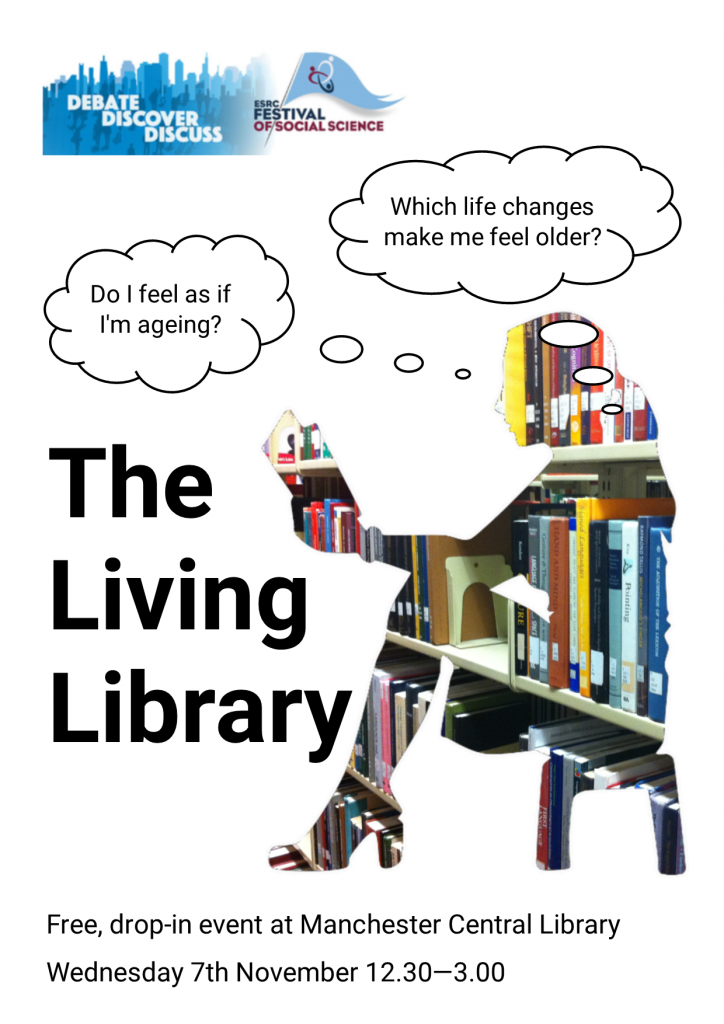Bram Vanhoutte and Finn Dymond-Green on their ESRC Festival of Social Science ‘Living Library’ event.
How does it feel to age? Which life changes make you feel older?
For the ESRC Festival of Social Science – a national celebration of how social science affects everyday lives – we have organised a ‘Living Library’ event on “how ageing feels” which will take place in central library in Manchester on Wednesday 7th November from 12.30-3.00. It’s a free, drop-in event.
The living library, which consists of human books that are available to consult, containing lived experience and personal insights, is combined with a possibly contrasting backdrop of quantitative data on ageing events based on the English Longitudinal Study of Ageing. This event invites people to reshape their image of what ageing is like in the UK, which connects to Bram’s wider research agenda that seeks to redefine ageing dynamically.
My research, which focuses on investigating how exactly people age, underlines that rather than counting a certain number of years, ageing is a multidimensional process, which entails experiencing a number of common events. Things like:
- losing a partner,
- losing functional health or
- losing wealth.
While these events are things that can happen to all of us as we grow older, importantly they happen at widely differing times for different people.
While some people might start having functional health issues before the age of 60, others are well into their 80s, but do not experience any limitations in their daily activities due to their health. My research shows how social inequalities, which build up opportunities for the advantaged and risks for the disadvantaged over the life course, in later life is translated into inequalities of timing.
Differences between high and low become differences between early and late.
Secondly, I emphasize how these “risks” of ageing are there for all of us, not just for the precarious. If you are lucky enough to grow old, you will be subject to these risks of ageing, which will definitely happen at some point in your life.
While people might be convinced, rightfully or not, that they will never become unemployed, all humans share these vulnerabilities of ageing, and they expose our common frailties. It makes you wonder why we do not prepare for ageing better on a societal level!
Thirdly, as you will already be aware in the back of your mind, people do experience these events differently.
To put it bluntly: Losing your partner might be a tragedy for some, but also relief for others, depending on the exact situation leading up to the loss.
This aspect, centring on resilience and how people deal with these events, is something I will focus on in the coming year.
Anyway, enough about my research, what exactly is a living library?

A Living Library event is, at heart, a great way to bring people together and share life experiences. Almost everyone is familiar with libraries as a place you can borrow books from a period of time, so the metaphor is an easy one to understand in a public event.
Our wonderful volunteers will be ‘books’ on the Living Library shelf, each one with many stories to tell of their experiences of ageing. Members of the public will be able to ‘borrow’ a book for fifteen minutes and find out more about those life stories.
It’s a wonderful way to shatter stereotypes, gives people the chance to have an informal one-to-one chat and allows people to tell their own story, instead of having one projected onto them.
And it’s a great way to connect Bram’s research and the data he’s used with real lived experience.

Bram Vanhoutte, @bvhoutte, is one of the UK Data Service Data Impact Fellows. Bram is a Research Fellow in Sociology at the Cathie Marsh Institute for Social Research at The University of Manchester.
The main focus of his research is the different ways in which people age, and in particular how ageing is influenced by individuals’ earlier lives.
 Finn Dymond-Green is the UK Data Service Impact Manager.
Finn Dymond-Green is the UK Data Service Impact Manager.
